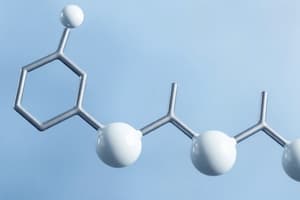Podcast
Questions and Answers
What is the primary reason why carbon is considered the central atom in organic chemistry?
What is the primary reason why carbon is considered the central atom in organic chemistry?
- Its electronic configuration
- Its position in Group 4a of the periodic table
- Its ability to form multiple bonds (correct)
- Its availability in abundant quantities
Which type of hybridization does carbon exhibit when forming single bonds in organic compounds?
Which type of hybridization does carbon exhibit when forming single bonds in organic compounds?
- sp4
- sp
- sp3 (correct)
- sp2
What is the role of S and P orbitals in the bonding behavior of carbon in organic chemistry?
What is the role of S and P orbitals in the bonding behavior of carbon in organic chemistry?
- S and P orbitals are irrelevant in organic chemistry
- S and P orbitals are used for ionic bonding
- S and P orbitals are primarily used by carbon for bonding (correct)
- S and P orbitals form double bonds in organic compounds
Which element has a similar electron configuration to carbon but cannot form as many bonds?
Which element has a similar electron configuration to carbon but cannot form as many bonds?
In organic chemistry, what allows carbon to form multiple bonds?
In organic chemistry, what allows carbon to form multiple bonds?
Which geometry and hybridization are associated with carbon forming double bonds in organic compounds?
Which geometry and hybridization are associated with carbon forming double bonds in organic compounds?
What type of bonds does carbon primarily form with other carbon atoms?
What type of bonds does carbon primarily form with other carbon atoms?
Which element can only form one bond due to having six electrons with three lone pairs?
Which element can only form one bond due to having six electrons with three lone pairs?
How many lone pairs does nitrogen typically have in organic compounds?
How many lone pairs does nitrogen typically have in organic compounds?
What is the main reason why carbon is considered the central atom in organic chemistry?
What is the main reason why carbon is considered the central atom in organic chemistry?
Study Notes
- Organic chemistry: study of chemistry involving living systems, particularly carbon
- Carbon is in Group 4a with four valence electrons, allowing it to form multiple bonds
- Organic chemistry deals with creating organic substances or compounds
- Carbon has a unique atomic structure with a nucleus containing protons and neutrons, surrounded by electrons in orbitals
- S and P orbitals are relevant in organic chemistry as carbon primarily uses these orbitals for bonding
- Carbon binds to other carbon atoms to form long chains and rings, following the octet rule
- Tetrahedral geometry and sp3 hybridization for single bonds
- Trigonal planar geometry and sp2 hybridization for double bonds
- Common bonding partners for carbon include hydrogen, halogens, nitrogen, and oxygen
- Halogens have six electrons with three pairs of lone pairs, can only form one bond
- Nitrogen has two lone pairs and can form three bonds.
- Carbon is the central atom in organic chemistry due to its ability to form multiple bonds and diverse structures.
Studying That Suits You
Use AI to generate personalized quizzes and flashcards to suit your learning preferences.
Description
Explore the basic concepts of organic chemistry, focusing on the study of carbon-based compounds and their unique properties. Learn about carbon's valence electrons, orbital structures, bonding geometries, and common bonding partners in organic molecules.



